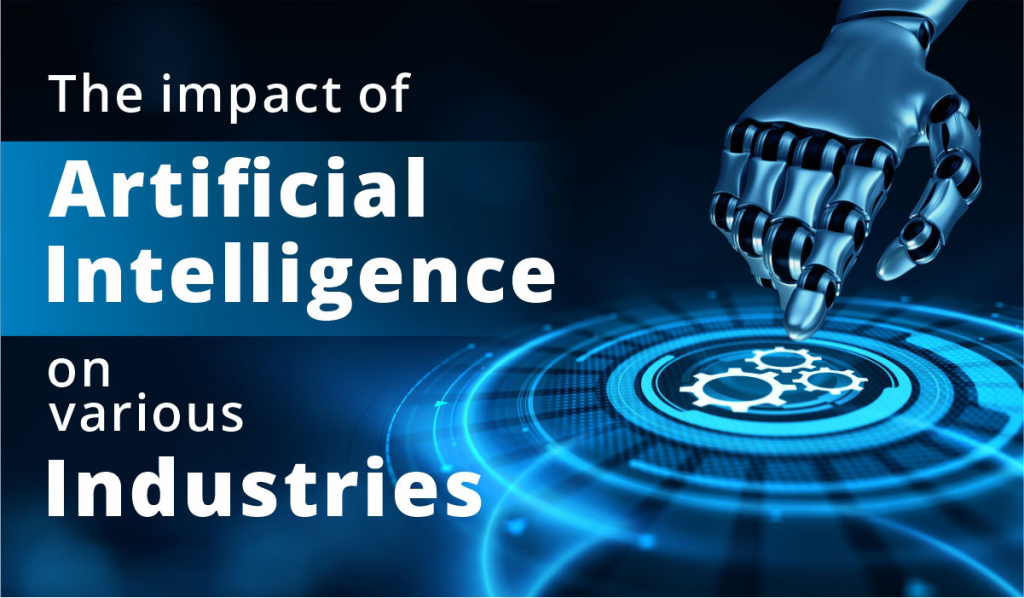
Artificial Intelligence (AI) has emerged as a groundbreaking technology that is revolutionizing numerous industries worldwide. Its capacity to analyze vast amounts of data, recognize patterns, and make intelligent decisions has led to significant changes in how businesses operate, uncovering new opportunities for growth and efficiency. In this blog post, we will delve into the profound impact of AI on various industries, exploring the remarkable benefits it brings and the challenges it poses.
Artificial intelligence (AI) has emerged as a transformative force in today’s dynamic and ever-changing world. Its influence spans across a wide array of industries, bringing about revolutionary changes to our lifestyles, professional endeavors, and social interactions. Sectors such as healthcare, finance, education, and entertainment have all experienced profound transformations as a result of AI’s capabilities. In this blog post, we will delve into the far-reaching impact of AI on various industries, with a particular emphasis on its effects on students and their perspectives.
- Healthcare: AI is revolutionizing the healthcare sector by enhancing diagnosis, treatment, and patient care. Machine learning algorithms enable the analysis of medical images, aiding in disease detection, outcome prediction, and precision medicine. AI-powered chatbots and virtual assistants improve patient engagement and support, while facilitating drug discovery, clinical trials, and personalized healthcare. These advancements lead to more effective and efficient healthcare delivery.
- Finance: The finance industry is leveraging AI to streamline operations, enhance risk management, and elevate customer experiences. AI algorithms analyze extensive financial data, detecting fraud, predicting market trends, and automating trading processes. Chatbots and virtual assistants provide personalized financial advice and support, while AI-powered credit scoring systems transform lending practices, promoting accessibility and efficiency in financial services.
- Manufacturing: AI is transforming the manufacturing sector by optimizing production processes, improving quality control, and enabling predictive maintenance. Real-time analysis of sensor data by machine learning algorithms detects anomalies, prevents equipment failures, and minimizes downtime. AI-powered robotics and automation systems enhance productivity and precision, while advancements in supply chain management, demand forecasting, and inventory optimization are driven by AI technology.
- Retail: AI is reshaping the retail industry through personalized shopping experiences, improved inventory management, and enhanced customer engagement. AI-driven recommendation systems analyze customer preferences and behaviors to offer tailored product suggestions. Chatbots and virtual assistants deliver round-the-clock customer support, and computer vision technology revolutionizes cashierless stores, elevating the shopping experience.
- Transportation: AI is revolutionizing transportation by facilitating autonomous vehicles, optimizing logistics, and improving safety. Self-driving cars powered by AI algorithms are poised to enhance road safety, alleviate traffic congestion, and provide efficient transportation solutions. AI aids in route planning optimization, predictive maintenance, and management of smart traffic systems. Additionally, AI-powered drones transform delivery services, particularly in remote areas.
- Agriculture and Farming: AI is bringing about a revolution in the agricultural sector, significantly improving crop yields, monitoring soil conditions, and optimizing resource usage. Utilizing AI-powered drones and satellite imaging, farmers can effectively analyze crop health, enabling the early detection of diseases, pests, or nutrient deficiencies. By employing machine learning algorithms, optimal planting and harvesting times can be predicted with greater accuracy, leading to improved yield forecasts. Smart irrigation systems driven by AI contribute to the optimization of water usage, conserving resources and reducing costs.
- Energy and Utilities: AI plays a crucial role in optimizing energy generation, enhancing grid management, and improving resource efficiency within the energy sector. AI algorithms leverage data from smart meters and sensors to forecast energy demand, allowing utilities to optimize energy generation and distribution. Predictive maintenance systems powered by AI monitor energy infrastructure, efficiently detecting anomalies and reducing downtime. Moreover, AI aids in identifying energy-saving opportunities and facilitating the integration of renewable energy sources.
- Human Resources and Recruitment: AI is transforming human resources (HR) and recruitment processes by automating repetitive tasks, refining candidate selection, and enhancing employee engagement. AI-driven applicant tracking systems effectively analyze resumes, screen candidates, and identify the best-suited individuals for specific roles. Chatbots and virtual assistants provide valuable support to employees by addressing HR-related queries, clarifying policies, and explaining benefits. AI-driven sentiment analysis tools help assess employee engagement and satisfaction, empowering organizations to proactively implement measures for retention and professional development.
Conclusion: Artificial Intelligence is ushering in transformative changes across a wide range of industries, reshaping business models, and unlocking new possibilities. From healthcare to finance, manufacturing to retail, and transportation to education, AI is driving operational improvements, enhancing decision-making, and elevating customer experiences. However, it is essential to address challenges related to data privacy, ethics, and ensuring human oversight in AI systems to fully harness its potential. As AI continues to evolve, it will undoubtedly catalyze further transformations, making our world smarter, interconnected, and more innovative than ever before.
Thanks






Leave a Reply
You must be logged in to post a comment.